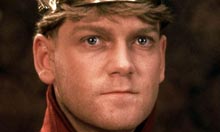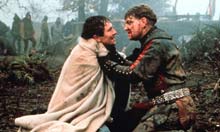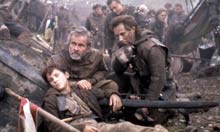Kenneth Branagh's Henry V: right royal entertainment
Though a little too fresh-faced, Branagh's compelling warrior king more than made up for Shakespeare's lack of historical accuracy
Breech birth … Kenneth Branagh in Henry V. All photos: Ronald Grant Archive
- Henry V
- Production year: 1989
- Country: UK
- Cert (UK): PG
- Runtime: 137 mins
- Directors: Kenneth Branagh
- Cast: Derek Jacobi, Emma Thompson, Kenneth Branagh, Simon Shepherd
Henry V became king of England in 1413. Though he reigned for just nine years before dying of dysentery aged 35, he is remembered as a great warrior king for his victory over the French at the battle of Agincourt in 1415. His career was depicted by William Shakespeare across three plays: Henry IV Parts 1 and 2, and Henry V.
Casting
 Clean-shaven ... and oddly unscarred At 29, Kenneth Branagh (who directed and took the lead role) was exactly the right age to play the king, but too fresh-faced. The real Henry V was wounded at the battle of Shrewsbury in 1403, when he was Prince Hal. He briefly lifted his helmet's visor, and an arrow pierced below his left eye. Despite the arrow lodging in his face to a depth of six inches, he stayed on the battlefield until the day was won. The arrowhead was later removed by surgeon John Bradmore with a sort of improvised corkscrew, and the wound treated with an ointment of flour, barley, honey and turpentine. The future Henry V survived – but with a striking facial scar which is nowhere to be seen in this movie.
Clean-shaven ... and oddly unscarred At 29, Kenneth Branagh (who directed and took the lead role) was exactly the right age to play the king, but too fresh-faced. The real Henry V was wounded at the battle of Shrewsbury in 1403, when he was Prince Hal. He briefly lifted his helmet's visor, and an arrow pierced below his left eye. Despite the arrow lodging in his face to a depth of six inches, he stayed on the battlefield until the day was won. The arrowhead was later removed by surgeon John Bradmore with a sort of improvised corkscrew, and the wound treated with an ointment of flour, barley, honey and turpentine. The future Henry V survived – but with a striking facial scar which is nowhere to be seen in this movie.War
 Cry God for Harry, England and St George The film's centrepiece is the battle of Agincourt itself. Henry's victory owed much to English and Welsh archers, whose longbows wiped out huge numbers of the French. Perhaps for reasons of staging or narrative development, Shakespeare's play focuses instead on hand-to-hand fighting. The movie redresses this balance, showing lines of archers firing deadly hails of arrows into the air. It brings in several other likely realities of a medieval battle: the trampling of horses, the looting of the dead, and the pools of muddy rainwater turned pink with the blood of the wounded. All of which would have been quite challenging to stage at the Globe in 1599, but are ideal material for cinema.
Cry God for Harry, England and St George The film's centrepiece is the battle of Agincourt itself. Henry's victory owed much to English and Welsh archers, whose longbows wiped out huge numbers of the French. Perhaps for reasons of staging or narrative development, Shakespeare's play focuses instead on hand-to-hand fighting. The movie redresses this balance, showing lines of archers firing deadly hails of arrows into the air. It brings in several other likely realities of a medieval battle: the trampling of horses, the looting of the dead, and the pools of muddy rainwater turned pink with the blood of the wounded. All of which would have been quite challenging to stage at the Globe in 1599, but are ideal material for cinema.Violence
 Hooray for historically correct slaughter In the real battle of Agincourt, just after the English appeared to have won, Henry V notoriously ordered the mass slaughter of French prisoners – perhaps thousands of them. In the movie, this doesn't happen. It does, however, in the play. At the end of Act IV, scene six, Henry says to the Duke of Exeter:
Hooray for historically correct slaughter In the real battle of Agincourt, just after the English appeared to have won, Henry V notoriously ordered the mass slaughter of French prisoners – perhaps thousands of them. In the movie, this doesn't happen. It does, however, in the play. At the end of Act IV, scene six, Henry says to the Duke of Exeter:The French have reinforced their scatter'd men;Shakespeare played up the violence, bloodshed and destruction of the French campaign, which his main historical source, Holinshed's Chronicles, did not. Neither Branagh's version nor Laurence Olivier's 1944 production included the murder of the French prisoners. Branagh's film is closer to the gritty Shakespearean version than Olivier's, though, and does include some of the nasty bits that Olivier cut. For instance, Branagh delivers with venom the speech in Act III, scene three in which Henry announces to the citizens of Harfleur that they must surrender or his soldiers will defile their daughters, murder their fathers and impale their babies on pikes. Unlike the murder of the prisoners, these lines are from Shakespeare's imagination – so Olivier's film was not necessarily inaccurate in leaving them out, and Branagh's not necessarily accurate for keeping them in.
Then every soldier kill his prisoners,
Give the word through.
Romance
 'I've decided to make love, not war' After the fighting, Branagh's film shifts genres abruptly and becomes a romance. The treaty of Troyes, by which Henry became heir to the French throne and married Catherine de Valois (Emma Thompson), actually took place five years after Agincourt. Shakespeare elided these events, and used dramatic licence in suggesting Henry and Catherine were unable to speak the same language. In real life, Henry certainly would have spoken French. It's easy to forgive: the Franglais courtship in Act V, scene two may be inaccurate, but it is one of Shakespeare's most charming love scenes.
'I've decided to make love, not war' After the fighting, Branagh's film shifts genres abruptly and becomes a romance. The treaty of Troyes, by which Henry became heir to the French throne and married Catherine de Valois (Emma Thompson), actually took place five years after Agincourt. Shakespeare elided these events, and used dramatic licence in suggesting Henry and Catherine were unable to speak the same language. In real life, Henry certainly would have spoken French. It's easy to forgive: the Franglais courtship in Act V, scene two may be inaccurate, but it is one of Shakespeare's most charming love scenes.Verdict
The play ends with an epilogue from the Chorus:There are plenty of historical movies of which that could be said, but not this one.
Thus far, with rough and all-unable pen,
Our bending author hath pursued the story,
In little room confining mighty men,
Mangling by starts the full course of their glory.
1 comment:
This was a brilliant movie and the ending speech to his victorious soldiers is breathtaking, brings you to tears. You can see why he was compared to Olivier at the time. Emma Thompson, his wife at the time and relatively unknown in the US, has a small role.
Post a Comment